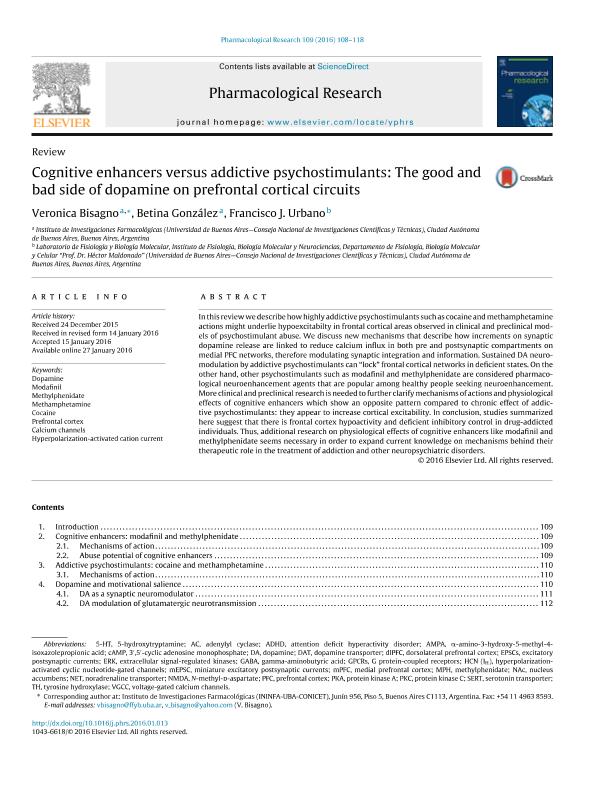Artículo
Cognitive enhancers versus addictive psychostimulants: The good and bad side of dopamine on prefrontal cortical circuits
Fecha de publicación:
07/2016
Editorial:
Academic Press Ltd - Elsevier Science Ltd
Revista:
Pharmacological Research
ISSN:
1043-6618
Idioma:
Inglés
Tipo de recurso:
Artículo publicado
Clasificación temática:
Resumen
In this review we describe how highly addictive psychostimulants such as cocaine and methamphetamineactions might underlie hypoexcitabilty in frontal cortical areas observed in clinical and preclinical modelsof psychostimulant abuse. We discuss new mechanisms that describe how increments on synapticdopamine release are linked to reduce calcium influx in both pre and postsynaptic compartments onmedial PFC networks, therefore modulating synaptic integration and information. Sustained DA neuromodulationby addictive psychostimulants can ?lock? frontal cortical networks in deficient states. On theother hand, other psychostimulants such as modafinil and methylphenidate are considered pharmacologicalneuroenhancement agents that are popular among healthy people seeking neuroenhancement.More clinical and preclinical research is needed to further clarify mechanisms of actions and physiologicaleffects of cognitive enhancers which show an opposite pattern compared to chronic effect of addictivepsychostimulants: they appear to increase cortical excitability. In conclusion, studies summarizedhere suggest that there is frontal cortex hypoactivity and deficient inhibitory control in drug-addictedindividuals. Thus, additional research on physiological effects of cognitive enhancers like modafinil andmethylphenidate seems necessary in order to expand current knowledge on mechanisms behind theirtherapeutic role in the treatment of addiction and other neuropsychiatric disorders.
Palabras clave:
Dopamine
,
Modafinil
,
Methylphenidate
,
Methamphetamine
Archivos asociados
Licencia
Identificadores
Colecciones
Articulos(IFIBYNE)
Articulos de INST.DE FISIOL., BIOL.MOLECULAR Y NEUROCIENCIAS
Articulos de INST.DE FISIOL., BIOL.MOLECULAR Y NEUROCIENCIAS
Articulos(ININFA)
Articulos de INST.DE INVEST.FARMACOLOGICAS (I)
Articulos de INST.DE INVEST.FARMACOLOGICAS (I)
Citación
Bisagno, Veronica; Gonzalez, Betina; Urbano Suarez, Francisco Jose; Cognitive enhancers versus addictive psychostimulants: The good and bad side of dopamine on prefrontal cortical circuits; Academic Press Ltd - Elsevier Science Ltd; Pharmacological Research; 109; 7-2016; 108-118
Compartir
Altmétricas




